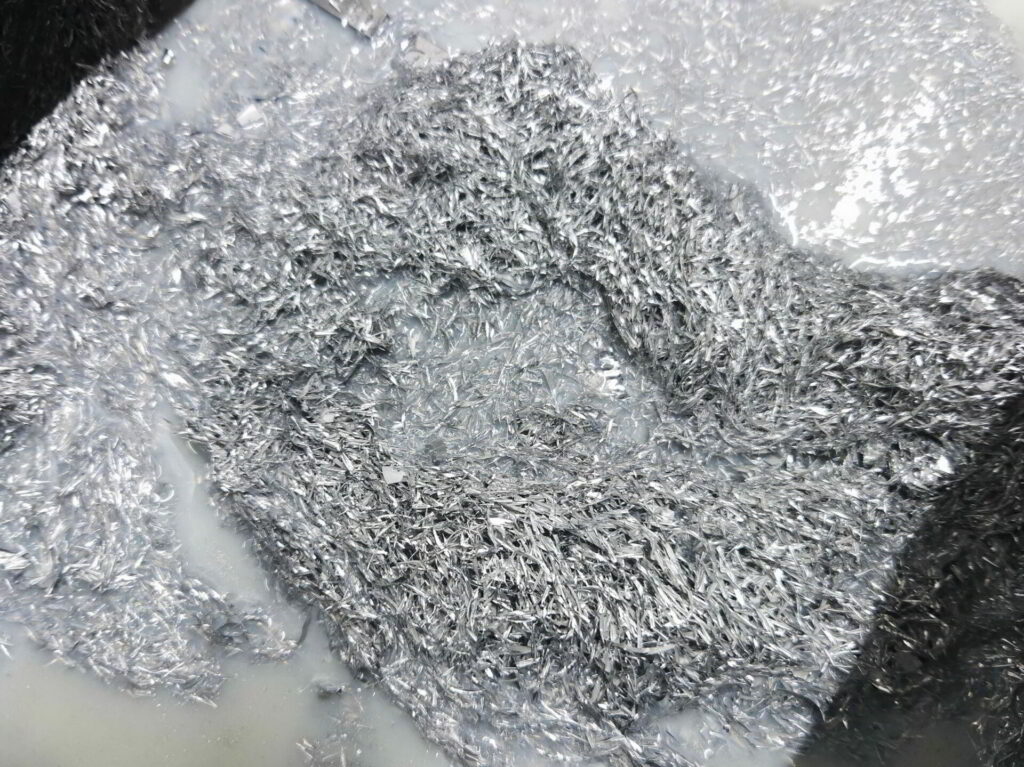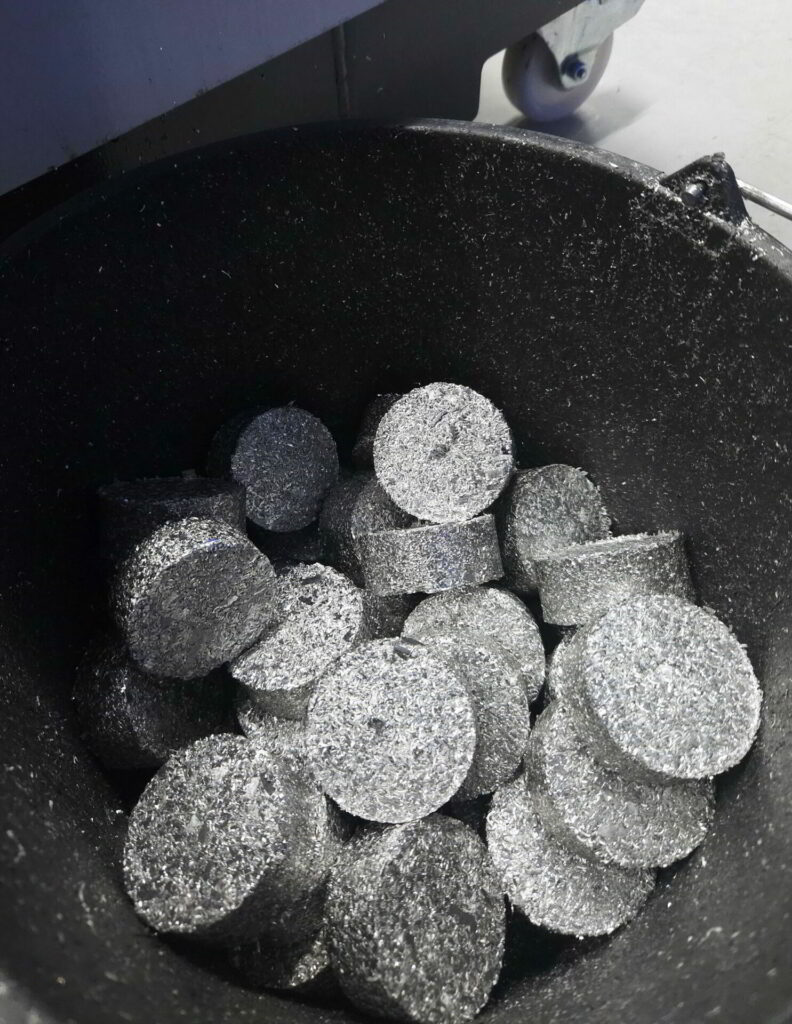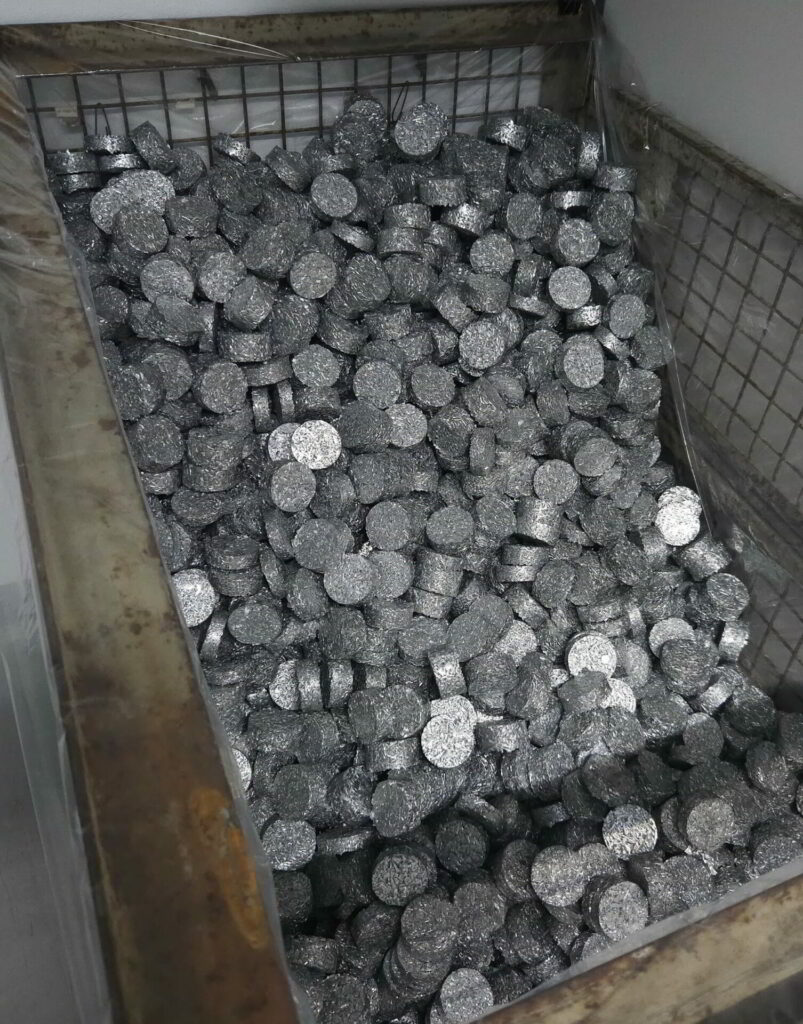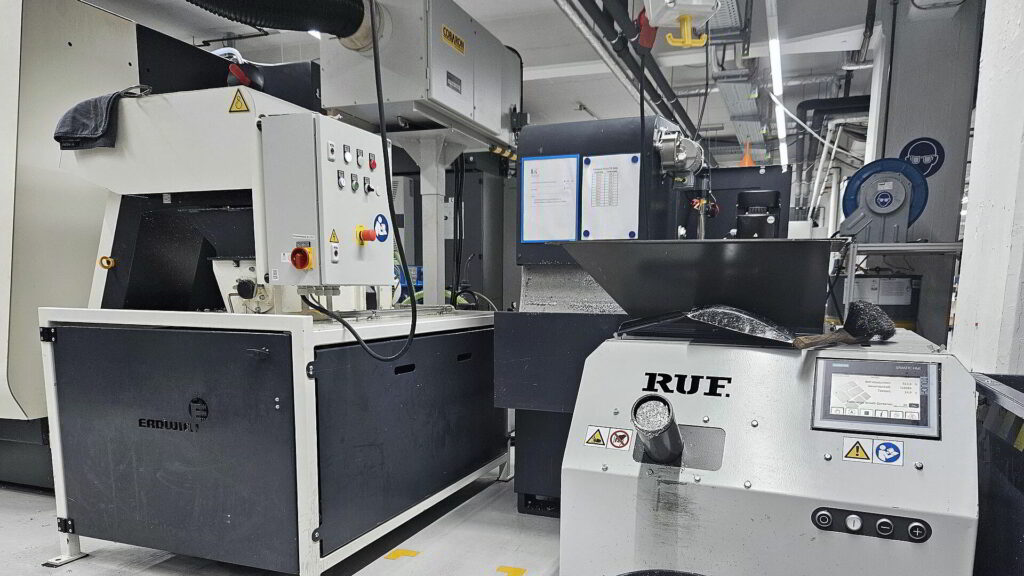Carl Zeiss Sports Optics uses specialised RUF presses for small chip volumes at its machining centres

With three particularly compact and mobile briquetting systems of the Formika type from RUF Maschinenbau GmbH & Co. KG, Carl Zeiss Sports Optics presses aluminium chips from machining operations into almost dry briquettes. This significantly reduces handling effort at the company’s Wetzlar site and enables substantially higher returns from the sale of valuable production residues.
Carl Zeiss Sports Optics GmbH is renowned worldwide for its premium optical products. Around 130 employees at the Wetzlar facility manufacture and distribute binoculars (with and without integrated rangefinders), monoculars, spotting scopes, night vision and thermal imaging devices, rifle scopes and reflex sights. The Wetzlar site also hosts customer service and repairs, quality assurance, and logistics for these products.
Housings and other functional components for these high-end optical products are predominantly produced by turning and milling aluminium. For instance, rifle scope housings are machined from solid aluminium cylinders, with up to 85% of the material being removed — valuable secondary raw material that can be recycled.
Wet chips caused a high handling effort.
For a long time, recycling aluminium chips into the materials cycle was a labour-intensive process for the machining experts at Carl Zeiss Sports Optics. Chips contaminated with coolant were collected at the machining centres in containers. The turning chips, in particular, took up large volumes, meaning that the full containers had to be transported three to four times per day by forklift and emptied into a large central container in the yard.
Michael Schurek, Head of Mechanical Machining, recalls: “At the end of each shift, two employees were occupied with this task.” The large collection container was collected weekly, sometimes twice a week, and replaced with an empty one. “Both internal and external transport required considerable effort,” explains Schurek. “In addition, the coolant caused contamination during transport.”
Flexible press designed for small chip quantities

These disadvantages had long been a thorn in the side of those responsible. When production was reorganised in 2023, the opportunity was taken to solve the chip-handling issue sustainably. The team was already familiar with briquetting as the ideal solution for such applications. Turning to RUF was therefore an obvious step – especially since RUF briquetting systems were already in successful use at other Carl Zeiss sites.
In 2022, RUF had launched the Formika, a particularly cost-effective and mobile briquetting press for smaller chip volumes, capable of processing aluminium and other metals – perfectly suited to the requirements of Carl Zeiss Sports Optics. Working closely with machining experts, RUF technical consultant Ralf Lorbach developed a system concept consisting of three RUF Formika presses and three chip shredders.
From machining centre straight into the briquetting press
One of the presses is directly connected to a milling centre – as is the case for most Formika users. For this setup, RUF engineers designed the press with a particularly low height, enabling chips from the machining centre to be fed directly into the press hopper.
Weighing just 650 kg and mounted on castors, the press is extremely mobile and can be easily moved to different locations. Once a sufficient amount of material is collected in the hopper, the press starts automatically.
Driven by an energy-efficient 2.2 kW motor, it achieves a specific pressure of 1,300 kg/cm². Coolants and lubricants are almost completely pressed out during the compaction process, resulting in briquettes with a residual moisture content of around 3%, which decreases further as they dry naturally.
The compact aluminium briquettes, each 60 mm in diameter, 20 mm high and weighing around 110 g, have a density of approx. 2 kg/dm³. The briquette collection box only needs to be replaced after many shifts, enabling unmanned 24/7 operation of the machining centres.
The extracted coolant is pumped into a collection tank by the integrated coolant pump and can often be reused – after filtration if required – contributing to sustainability and cost savings. Coolant concentrate costs have been reduced by around 70%.

Volume reduction of up to 1:18
The reduction in volume achieved through briquetting is remarkable. “For aluminium turning chips, the advantage is particularly striking – the bulk density of the briquettes is 15 to 18 times higher than that of the loose chips,” explains RUF expert Ralf Lorbach.
For milling chips, the effect is somewhat smaller.
When integrating the two additional RUF presses into production, Carl Zeiss Sports Optics had to make some compromises: direct connection to the machining centres – normally a major advantage of the Formika – was not feasible here. These two presses process chips from two lathes and a turn-mill centre. The chips are often long and thick, so each system is equipped with a pre-connected chip shredder.
Chips fall from the machines into the shredders, are reduced in size, and collected in containers that can hold the output of several shifts before being rolled over to the nearby Formika press and emptied into its hopper.

Workload reduced to a fraction
After around two years of experience with the RUF presses, Michael Schurek is fully satisfied with the new setup: “The effort required for chip handling has been reduced to a fraction. Everything that still needs to be done manually can be carried out alongside other tasks.”
The conversion of wet chips into dry briquettes also yields significantly higher returns when sold as secondary raw material. Carl Zeiss Sports Optics does not wish to disclose exact figures, but other RUF customers report prices of €160 to €200 per tonne.
Set up, connect, start
Commissioning the presses was extremely quick, thanks to the plug-and-play system design.“The systems were very flexible to install. We provided the power supply, set up small containers for the coolant, and the presses were ready for operation,” explains Schurek.
The presses are also low-maintenance in daily use: “Maintenance requirements are minimal – we simply lubricate a few moving parts at regular intervals and occasionally check the systems for contamination,” says the department head.
“Our collaboration with RUF has been excellent. Whenever questions arose, we always received prompt support.”